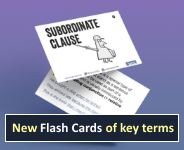Glossary: word
Explanation
A word is a unit of grammar: it can be selected and moved around relatively independently, but cannot easily be split. In punctuation, words are normally separated by word spaces. Sometimes, a sequence that appears grammatically to be two words is collapsed into a single written word, indicated with a hyphen or apostrophe (e.g. well-built, he’s).
- headteacher or head teacher [can be written with or without a space]
- I’m going out.
- 9.30 am
Englicious contains many resources for English language in schools, but the vast majority of them require you to register and log in first. For more information, see What is Englicious?

